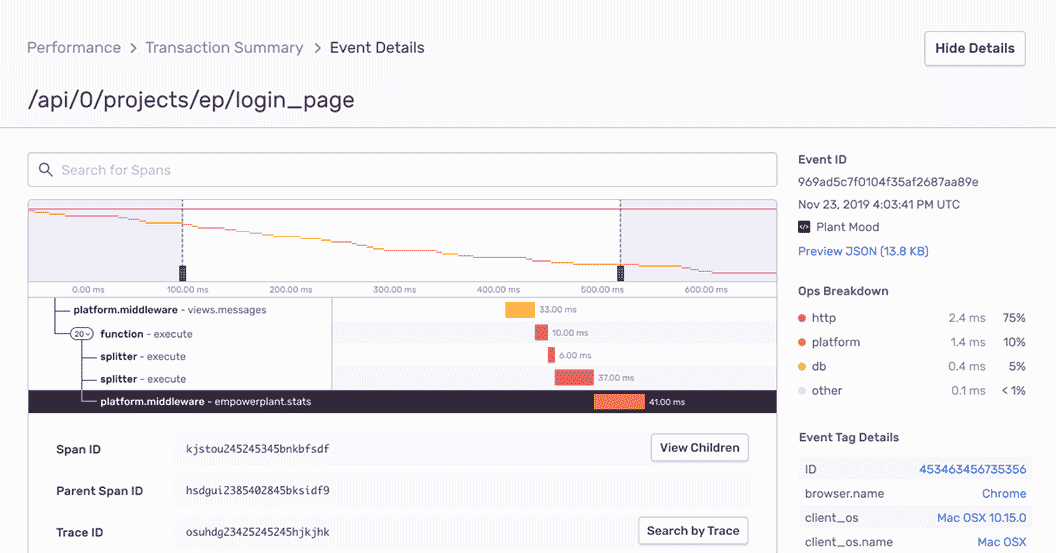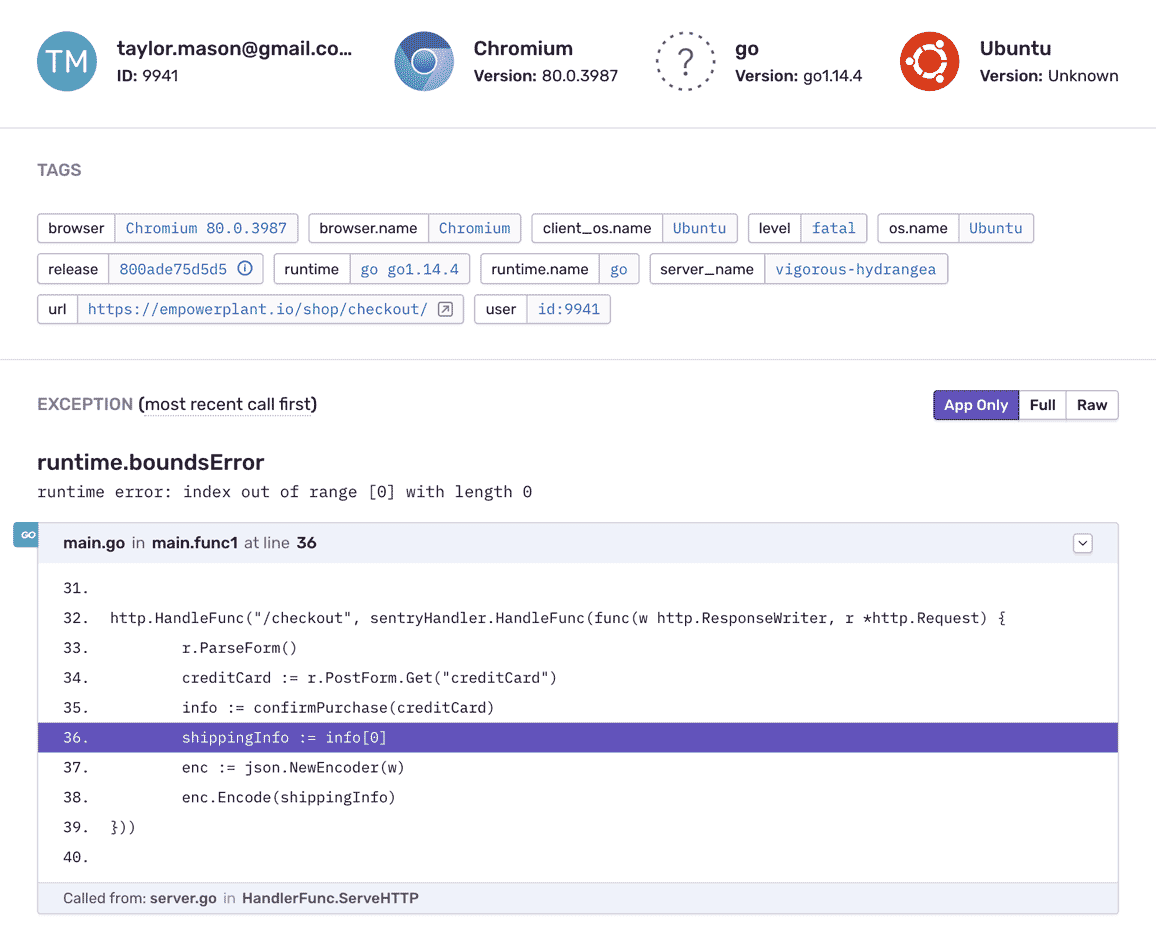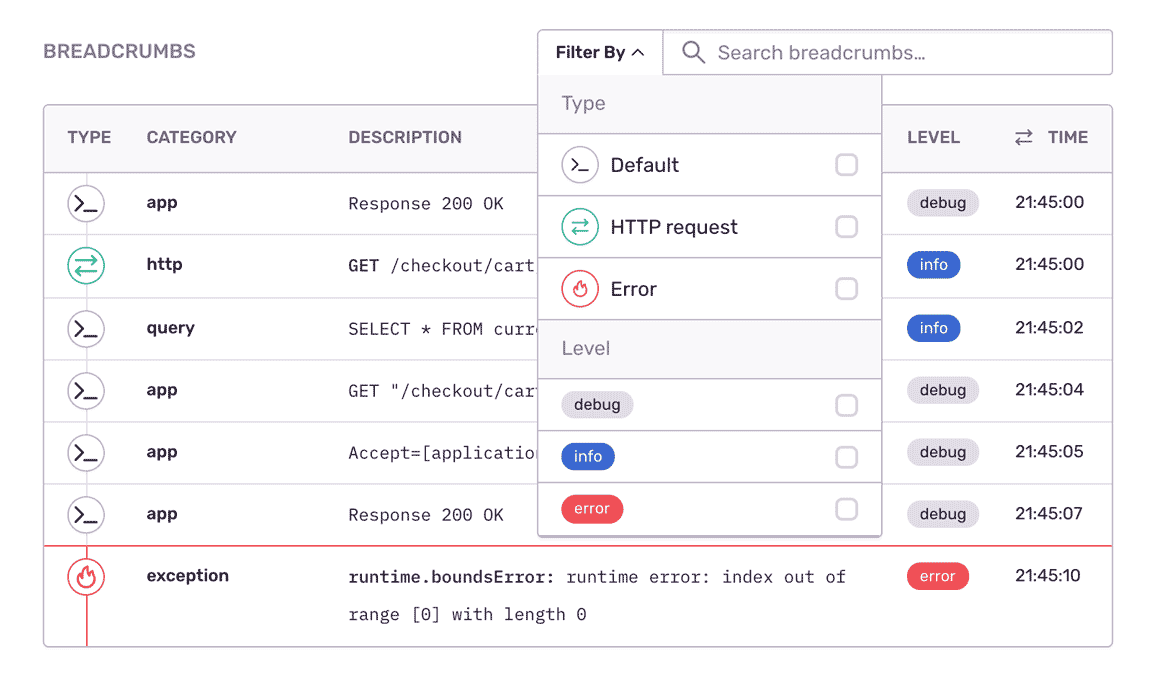
Rust Error Tracking and Performance Monitoring
Debug Rust apps and prevent crashes across your entire stack. Trace Rust performance issues back to a poor performing API call and surface any related code errors. Sentry provides a single platform to optimize the performance of Rust code and deliver fast customer experiences.
Getting Started is Simple
Grab the Sentry Rust SDK:
[dependencies] sentry = "0.41.0"
The most convenient way to use this library is the sentry::init function, which starts a Sentry client with a default set of integrations, and binds it to the current Hub. :
let _guard = sentry::init(("https://examplePublicKey@o0.ingest.sentry.io/0", sentry::ClientOptions { release: sentry::release_name!(), ..Default::default() }));
In Rust, you can capture and std::error::Error type.
let result = match function_returns_error() { Ok(result) => result, Err(err) => { sentry::capture_error(&err); return Err(err); } }
Check our documentation for the latest instructions.
See all platforms
Rust Error Monitoring With Complete Stack Traces
See details like filename and line number so you never have to guess with Rust errors. Filter and group Rust exceptions intuitively to eliminate noise. Monitor errors at scale without impacting throughput in production.

Fill In The Blanks About Rust Errors
Reproduce errors without user feedback. Sentry’s Rust error monitoring includes each bug’s history of events and actions.

Understand The Bigger Picture
Use issue graphs to understand frequency, scope, and impact of Rusterrors and prioritize what needs to be fixed. Get alerts via email, SMS, or chat when bugs make it into production without disrupting your development workflow.
“Sentry helps our team fix the most important issues in each release.”
See The Full Picture Of Any Rust Error
Understand the context that contributed to errors with tags and relevant information about your software, environment, and users.
You can also submit optional custom data to provide extra context for bug tracking that is unique to your application and business.
Find answers to key questions: Which clients’ users experienced this bug? Was their game running in 32 bit or 64 bit mode?
It’s why companies that don’t have a complete view of their infrastructure are being punished:
The average cost of network downtime is around $5,600 per minute — or $300,000 per hour.
1 out of 5 online shoppers will abandon their cart because the transaction process was too slow.
On average, a two-second slowdown in page load decreases revenues by 4.3 percent.
FAQs
Sentry supports every major language, framework, and library. You can browse each of them here.
You can get started for free. Pricing depends on the number of monthly events, transactions, and attachments that you send Sentry. For more details, visit our pricing page.
Sentry doesn’t impact a web site’s performance.
If you look at the configuration options for when you initialize Sentry in your code, you’ll see there’s nothing regarding minimizing its impact on your app’s performance. This is because our team of SDK engineers already developed Sentry with this in mind.
Sentry is a listener/handler for errors that asynchronously sends out the error/event to Sentry.io. This is non-blocking. The error/event only goes out if this is an error.
Global handlers have almost no impact as well, as they are native APIs provided by the browsers.
Supporting Resources
A better experience for your users. An easier life for your developers.
A peek at your privacy
Here’s a quick look at how Sentry handles your personal information (PII).
×Who we collect PII from
We collect PII about people browsing our website, users of the Sentry service, prospective customers, and people who otherwise interact with us.
What if my PII is included in data sent to Sentry by a Sentry customer (e.g., someone using Sentry to monitor their app)? In this case you have to contact the Sentry customer (e.g., the maker of the app). We do not control the data that is sent to us through the Sentry service for the purposes of application monitoring.
Am I included?PII we may collect about you
- PII provided by you and related to your
- Account, profile, and login
- Requests and inquiries
- Purchases
- PII collected from your device and usage
- PII collected from third parties (e.g., social media)
How we use your PII
- To operate our site and service
- To protect and improve our site and service
- To provide customer care and support
- To communicate with you
- For other purposes (that we inform you of at collection)
Third parties who receive your PII
We may disclose your PII to the following type of recipients:
- Subsidiaries and other affiliates
- Service providers
- Partners (go-to-market, analytics)
- Third-party platforms (when you connect them to our service)
- Governmental authorities (where necessary)
- An actual or potential buyer
We use cookies (but not for advertising)
- We do not use advertising or targeting cookies
- We use necessary cookies to run and improve our site and service
- You can disable cookies but this can impact your use or access to certain parts of our site and service
Know your rights
You may have the following rights related to your PII:
- Access, correct, and update
- Object to or restrict processing
- Port over
- Opt-out of marketing
- Be forgotten by Sentry
- Withdraw your consent
- Complain about us
If you have any questions or concerns about your privacy at Sentry, please email us at compliance@sentry.io.
If you are a California resident, see our Supplemental notice.